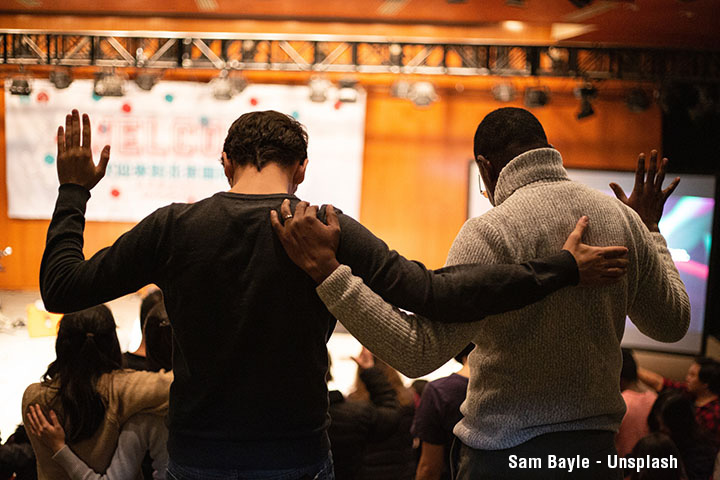An Associated Press poll last year reported that three-quarters of churchgoers in the U.S. plan to resume regular in-person attendance as the pandemic subsides. The pastors I know, looking out at the empty seats, still have their fingers crossed, hoping that prediction will eventually come true.

I confess that during the lockdown I rather enjoyed watching church services online while lounging in my bathrobe, sipping coffee, and controlling the pace with a remote. If something failed to hold my interest, I could surf the web in search of better music or a more engaging sermon.
I’m not alone. In the U.K., for example, church attendance averages less than 6 percent of the population. (The late poet R. S. Thomas, a priest in the Church of Wales, called himself “a vicar of large things in a small parish.”) Yet, a quarter of British adults watched or listened to a religious service during the coronavirus lockdown, and one in twenty started praying during the crisis.
As my memoir, Where the Light Fell, recounts, I’ve had a checkered history with the church. In childhood I sat through hellfire and brimstone sermons in my Southern fundamentalist congregation that barred African-Americans from entering and warned against electing a Catholic president (JFK). To recover, I spent a few years away from church before sampling a Sixties-style house church that substituted Coke and potato chips for bread and wine as the elements of communion.

Eventually I settled into a more traditional church in Chicago that combined a spirit of grace with an emphasis on social justice. Moving to a small town in Colorado, however, limited my options. The church I now attend once attracted a thousand regulars; after church splits and attrition, it currently averages less than thirty. With many good reasons to drop out, or tune in remotely, I ask myself why I have returned to the rented hall we use on Sundays.
The most important reason is to worship God. The weekly gathering underscores my creaturely status, one in need of a higher moral authority. As great souls such as Martin Luther King Jr., Václav Havel, and Simone Weil have reminded us, what we believe about a Creator can largely determine how we treat fellow humans—especially the marginalized—and our planet.
Jesus summarized the entire law in two commands: Love God and love your neighbor. I may fulfill the first one in the privacy of my home, but what about the second? “If you want to grow in love, the way to do it is not likely going to be by attending more Bible studies or prayer meetings; it will happen by getting close to people who are not like you,” writes the Canadian pastor Lee Beach.
 When I walk into a new church, the more its members resemble each other, and resemble me, the more uncomfortable I feel. One Sunday I sat sandwiched between an elderly man hooked up to a puffing oxygen tank and a breastfeeding baby who grunted loudly and contentedly throughout the sermon. Church offers a place where infants and grandparents, unemployed and executives, immigrants and blue bloods can all assemble together. Where else can we find that mixture? Certainly not online.
When I walk into a new church, the more its members resemble each other, and resemble me, the more uncomfortable I feel. One Sunday I sat sandwiched between an elderly man hooked up to a puffing oxygen tank and a breastfeeding baby who grunted loudly and contentedly throughout the sermon. Church offers a place where infants and grandparents, unemployed and executives, immigrants and blue bloods can all assemble together. Where else can we find that mixture? Certainly not online.

More, healthy congregations look beyond their walls to address social needs. For all its flaws, the church still mobilizes workers to feed and shelter homeless people, adopt foster children, visit prisoners, and resettle refugees. The Harvard political scientist Robert Putnam noted in Bowling Alone that “Nearly half of all associational memberships in America are church-related, half of all personal philanthropy is religious in character, and half of all volunteering occurs in a religious context.”
The church’s real challenge is to equip a community to serve others, rather than provide an entertainment venue—and that challenge is amplified when we no longer meet in person. I’ve noticed that sharp divisions over politics tend to fade in the background when believers join together in acts of service. Indeed, a true community can begin to take shape.
As I worked on my , I came to view church, like family, as a dysfunctional cluster of needy people. I think back to members of my childhood church, who showed up each Sunday to hear the pastor threaten them with hell, punishment for sins, and an imminent Armageddon. They came in part from fear, but also because, like a family, they needed each other in order to withstand the assaults of life. Members of the working class, they didn’t sit at home evenings fretting over the fine points of theology; they worried about how to pay bills and feed the kids. When a family’s house burned down, or a drunken husband locked his wife out, or a widow couldn’t afford her groceries, they had nowhere to turn but church.

Since those childhood days, I have found grace-dispensing churches that serve needs beyond those of their members. Admittedly, the pews are less comfortable than the chairs in my living room, and the quality of the worship service can’t match the slick productions I have watched during the pandemic’s shelter-in-place period. We tend to have a sense of community, though, something all too rare in our individualistic society.



Leave a Comment